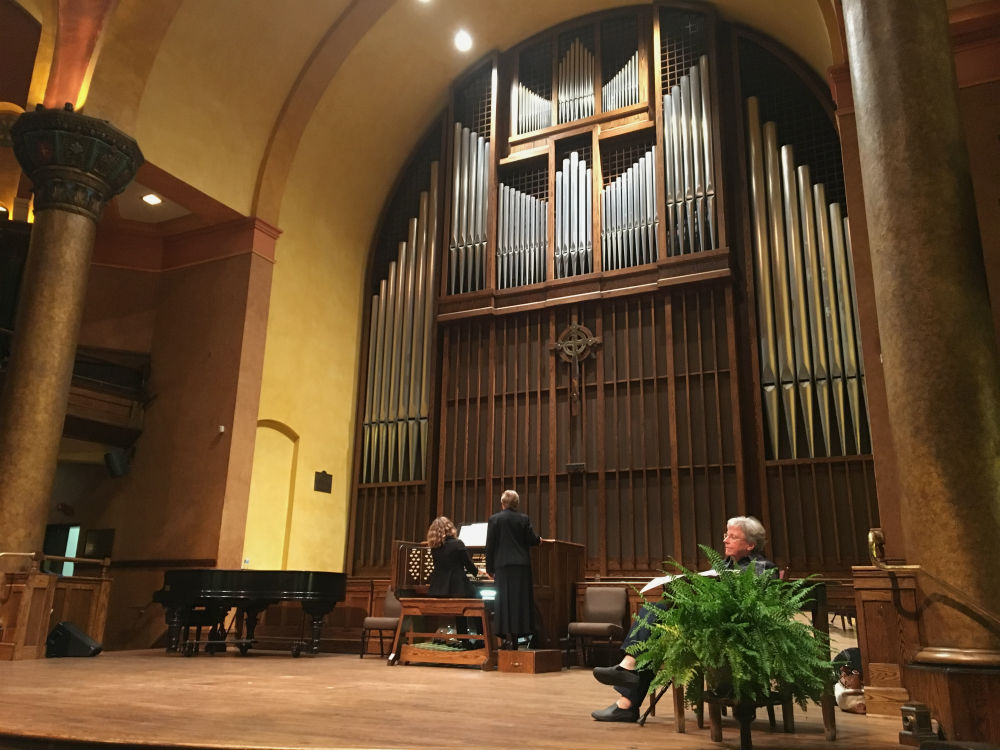Lack of funding prompts Royal Canadian College of Organists to host fundraising concert
By Julia Paulson
A national group that promotes public appreciation of organ music is trying to maintain a solid funding base for its prime outreach program after the loss of a City of Ottawa grant.
The Royal Canadian College of Organists hosted a fundraising concert at Dominion-Chalmers United Church on Nov. 5 after the group failed to secure its traditional city grant for the second straight year.
The RCCO did not receive funding for its Pro Organo program, which has been running since 1989. Despite receiving the grant up until 2014, the RCCO committee decided not to reapply this year after hearing from city officials that the reason they were denied a grant in recent years is because they were deemed to already have adequate overall funding.
“We do have a lot of money, but a lot of it is earmarked for scholarships or general programs for our membership, so we can’t really use it for Pro Organo,” said Karen Holmes, head of the Pro Organo committee and the organist at St. Peter’s Evangelical Lutheran Church on Sparks Street. “We have no paid staff. We’re all volunteers.”
At the fundraising concert, about 100 people sat in the church pews facing Dominion-Chalmer’s immense organ. The instrument towered over audience members and organists alike. Its exposed pipes gleamed as the organists played pieces that ranged from softly melodic to intensely dramatic.
Pro Organo was established to organize a series of four concerts per year, showcasing both local and international organists. Each organist plays on a different organ in Ottawa. This year marks the performance program’s 29th season, and the downtown churches used as venues have included Centretown United Church, Knox Presbyterian Church and First Church of Christ, Scientist.
The aim of the program is to provide community outreach and showcase the elaborate instruments that are usually only seen during church services.
“There’s lots of general public people who don’t go to churches all the time. It allows them to go into spaces that they wouldn’t see otherwise,” said Holmes.
Jennifer Loveless played in the fundraising concert at Dominion-Chalmers. The organ at Dominion-Chalmers is newer than most. Its opening recital was held in 1965. The organ was built using insurance money from the fire that destroyed the Dominion Church in its entirely, leading it to merge with Chalmers Church.
Loveless echoed Holmes’ frustration about the city’s decision to stop supporting the concert series.
“It was a bit strange,” she said. “I think it’s exciting what we do. It’s not strictly sacred music.”
Members of the Nov. 5 audience seemed to agree. Bev Humphries, a new Ottawa resident, was one of them.
“I just love the instrument,” she said. “It’s very powerful, it’s very dramatic, and it’s always exciting.”
“I’m in favour of supporting the arts,” added Humphries. “Especially in this case, as we just heard some beautiful music.”
Holmes said that the city’s Pro Organo grant only provided about $3,000 annually, but it made a significant difference. Hosting organ recitals isn’t cheap, she said. Professional organists’ fees can reach as high as $3,000 for one concert.
Additionally, the RCCO has traditionally invited organists from outside of Ottawa to play, and those performers require hotel rooms and have other expenses.
“It adds up quickly,” said Holmes. “Prices keep going up. Many churches are charging $500-$700 per event. I’d say we need about $15,000 per season.”
Most of Pro Organo’s costs are covered by donations, ticket sales and RCCO membership fees.
Gilles Leclerc, past president of the RCCO, said the decision to revoke the funding was also a mistake for Ottawa’s bottom line.
“The arts are not ever really considered a vital part of our culture,” said Leclerc. “This is a recurring problem, despite some members of the city council who have demonstrated the positive economic impact the arts have on our city.”
And according to Holmes, organ recitals are worth more than just their economic value. “Piano students get to hear professional pianists, violin students get to hear professional violinists, so we figure that organ students should get to hear professional organists.”
The RCCO has managed to make that dream a reality for at least one more year. The fundraising concert raised $3,400 — slightly more than the original grant usually provided.
However, Holmes warned that this strategy might not work every year. Without steady funding, there’s no guarantee that Pro Organo will make it to its 30th season.

